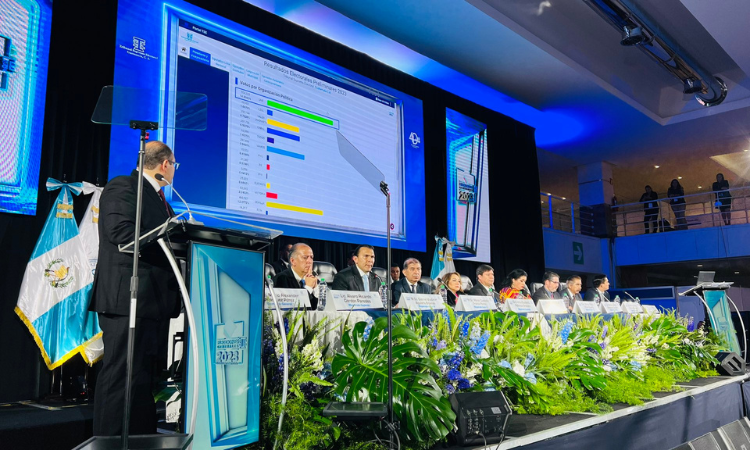On June 22, Simon Romero, Natalie Kitroeff, and Jody García published an article in the New York Times that amounted to a hit piece on the elections Guatemala celebrated this past Sunday, June 25.
This article followed a long line of recent media articles intending to portray Guatemala as a country that is turning towards authoritarianism, limiting press freedoms and political participation, all amid a deteriorating situation for human rights. In sum, the elections, we were warned, could be the death knell for democracy in Guatemala.
None of this turned out to be true. The news of the death of democracy in Guatemala was premature and ill-informed.
The great surprise of last Sunday’s elections was the phenomenal performance of the left-wing Semilla Movement (semilla means seed in Spanish). This was against the diverse interests of the ruling political party, the private sector, and the conservative populace of Guatemala. To its credit, Semilla, against all expectations, advanced to the second round of the presidential election to take place on August 20, 2023. It will face off against another leftwing party: UNE.
Semilla also outperformed expectations by winning at least 23 seats in the new legislature, over three times what was expected. In the presidential runoff, two clearly identified left-wing parties will battle for the presidency for the first time in Guatemalan political history. The candidate for UNE is Sandra Torres, an experienced political leader in left-wing Guatemalan politics. Likewise, Bernardo Arévalo of Semilla is an intellectually inclined political leader also clearly on the left side of the political spectrum in Guatemala.
The electoral results lay bare the naked attempt of the left-wing media to discredit elections they lose or think they will lose. This time, the disingenuous narrative backfired. The impressive performance of left-wing candidates leaves that clear. It turns out the international left-wing network of media and think tanks attempted to discredit and delegitimize an electoral process where leftist candidates turned out to be the clear winners.
Neither the government of Guatemala nor the political and economic elites of the country stopped them. In the end, it was a fair and transparent process. The left won fair and square.
The narrative of right-wing intolerance was also disproved. In the words of Rodrigo Arenas, owner of the media outlet favored by conservatives and classical liberals in Guatemala, RepúblicaGT:
“Today there are two big winners: Bernardo Arevalo and Semilla and Guatemalan democracy. Today we demonstrate that in Guatemala the elections are still free and democratic. Congratulations to the winners! Let’s go Guatemala!”
Such a conciliatory statement could not have been expected from the left, which, from the beginning, was committed to the narrative of fixed, unfair, and illegitimate elections.
It is in this context that the sensational hit piece by the Times must be read. The Times article alleged that Blanca Alfaro, a magistrate of Guatemala´s Supreme Electoral Tribunal (TSE), went to the US embassy in Guatemala to report having received bribes from Miguel Martínez, a close ally of President Alejandro Giammattei. The ostensible purpose was to influence the electoral results, although no claim of an explicit quid pro quo was even alleged in the Times article.
Make no mistake: the article was meant to have the impact of an “October Surprise” on the Guatemalan elections, and call into question the legitimacy of the entire electoral process. The Times quoted a Canadian scholar, Regina Bateson, who stated that the result would be an “election undermining democracy.”
The Times piece claimed the nation’s electoral agency had “disqualified every serious candidate in the race who could challenge the status quo.” The electoral results have mightily disproven these irresponsible claims.
While the truth of the Times‘s accusations could not be determined in time before the elections, as per design, the journalistic standards of Times can certainly be called into question. Once again, a Times article was published just before an election—long on smears and short on evidence, logic, and common sense. All that served to advance the left-wing media narrative that aspired to delegitimize the elections of Guatemala. To do this, the left-wing media (represented by Times) was willing to suspend the standards of professional journalism.
How so? The only source for the Times story was an anonymous witness, who allegedly was afraid to come forward for fear of reprisals. Both Alfaro and Martínez denied the allegations, as even the Times admitted in the very same article.
The US State Department stayed mum on the matter, and there was no confirmation of the substantive allegations underpinning the Times article. Regardless, they published it anyway.
It turned out to be much ado about nothing.
Once again, the Times published a spectacularly wrong article—much ado about something. The left won, fair and square and will govern Guatemala for the next four years. The left-wing media conspiracy narrative of corrupt politicians, ex-military, and “predatory elites” in the business sector (to use the phrase of the US State Department), never materialized. Everyone legally eligible was allowed to participate. Again, the left-wing opposition won.
Democracy is alive in Guatemala. Guatemala’s gradual progress towards democratic consolidation continues. Since the military victory over the communist totalitarian insurgency and the transition to civilian control of government, the country has celebrated eight national elections. Unlike the United States in 2016 and 2020, none have been seriously questioned, either nationally or internationally.
 Join us in our mission to foster positive relations between the United States and Latin America through independent journalism.
Join us in our mission to foster positive relations between the United States and Latin America through independent journalism.
As we improve our quality and deepen our coverage, we wish to make the Impunity Observer financially sustainable and reader-oriented. In return, we ask that you show your support in the form of subscriptions.
Non-subscribers can read up to six articles per month. Subscribe here.

